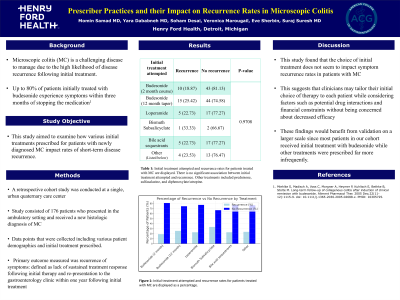Monday Poster Session
Category: Colon
P1941 - Prescriber Practices and their Impact on Recurrence Rates in Microscopic Colitis
Monday, October 28, 2024
10:30 AM - 4:00 PM ET
Location: Exhibit Hall E

Has Audio

Momin Samad, MD
Henry Ford Hospital
Rochester Hills, MI
Presenting Author(s)
Momin Samad, MD1, Suraj Suresh, MD2, Eve Sherbin, 3, Soham Desai, 4, Veronica Marougail, 5, Yara JN. Dababneh, MD2
1Henry Ford Hospital, Rochester Hills, MI; 2Henry Ford Health, Detroit, MI; 3Wayne State University School of Medicine, Detroit, MI; 4Wayne State University, Detroit, MI; 5Wayne State School of Medicine, Detroit, MI
Introduction: Microscopic colitis (MC) is a challenging disease to manage due to the high likelihood of disease recurrence following initial treatment. Some studies have shown that up to 80% of patients initially treated with budesonide experience symptoms within three months of stopping the medication. This study aimed to examine how various initial treatments prescribed for patients with newly diagnosed MC impact rates of short-term disease recurrence.
Methods: A retrospective cohort study was conducted at a single, urban quaternary care center in the midwestern United States and consisted of 176 patients who presented in the ambulatory setting and received a new histologic diagnosis of MC. Data points that were collected including various patient demographics and initial treatment prescribed. Primary outcome measured was recurrence of symptoms, defined as lack of sustained treatment response following initial therapy and re-presentation to the gastroenterology clinic within one year following initial treatment.
Results: 59 (34%) patients were treated initially with a budesonide 2-month taper and 53 (30%) patients were treated with a fixed daily dose of budesonide defined as a 2-month course. Additional treatments included 22 (12%) patients who received loperamide, 2 (5%) patients who received bismuth subsalicylate and 3 (8%) patients who received bile acid sequestrants. Other treatments included prednisone, sulfasalazine, and diphenoxylate/atropine which were prescribed in 7 (19%) of patients. A total of 40 (23%) patients who were treated with these medications experienced short-term recurrence of symptoms. A univariate analysis revealed no significant association between initial therapy attempted and frequency of recurrence (Table 1).
Discussion: This study found that the choice of initial treatment does not seem to impact symptom recurrence rates in patients with MC. This suggests that clinicians may tailor their initial choice of therapy to each patient while considering factors such as potential drug interactions and financial constraints without being concerned about decreased efficacy. These findings would benefit from validation on a larger scale since most patients in our cohort received initial treatment with budesonide while other treatments were prescribed far more infrequently.
Note: The table for this abstract can be viewed in the ePoster Gallery section of the ACG 2024 ePoster Site or in The American Journal of Gastroenterology's abstract supplement issue, both of which will be available starting October 27, 2024.
Disclosures:
Momin Samad, MD1, Suraj Suresh, MD2, Eve Sherbin, 3, Soham Desai, 4, Veronica Marougail, 5, Yara JN. Dababneh, MD2. P1941 - Prescriber Practices and their Impact on Recurrence Rates in Microscopic Colitis, ACG 2024 Annual Scientific Meeting Abstracts. Philadelphia, PA: American College of Gastroenterology.
1Henry Ford Hospital, Rochester Hills, MI; 2Henry Ford Health, Detroit, MI; 3Wayne State University School of Medicine, Detroit, MI; 4Wayne State University, Detroit, MI; 5Wayne State School of Medicine, Detroit, MI
Introduction: Microscopic colitis (MC) is a challenging disease to manage due to the high likelihood of disease recurrence following initial treatment. Some studies have shown that up to 80% of patients initially treated with budesonide experience symptoms within three months of stopping the medication. This study aimed to examine how various initial treatments prescribed for patients with newly diagnosed MC impact rates of short-term disease recurrence.
Methods: A retrospective cohort study was conducted at a single, urban quaternary care center in the midwestern United States and consisted of 176 patients who presented in the ambulatory setting and received a new histologic diagnosis of MC. Data points that were collected including various patient demographics and initial treatment prescribed. Primary outcome measured was recurrence of symptoms, defined as lack of sustained treatment response following initial therapy and re-presentation to the gastroenterology clinic within one year following initial treatment.
Results: 59 (34%) patients were treated initially with a budesonide 2-month taper and 53 (30%) patients were treated with a fixed daily dose of budesonide defined as a 2-month course. Additional treatments included 22 (12%) patients who received loperamide, 2 (5%) patients who received bismuth subsalicylate and 3 (8%) patients who received bile acid sequestrants. Other treatments included prednisone, sulfasalazine, and diphenoxylate/atropine which were prescribed in 7 (19%) of patients. A total of 40 (23%) patients who were treated with these medications experienced short-term recurrence of symptoms. A univariate analysis revealed no significant association between initial therapy attempted and frequency of recurrence (Table 1).
Discussion: This study found that the choice of initial treatment does not seem to impact symptom recurrence rates in patients with MC. This suggests that clinicians may tailor their initial choice of therapy to each patient while considering factors such as potential drug interactions and financial constraints without being concerned about decreased efficacy. These findings would benefit from validation on a larger scale since most patients in our cohort received initial treatment with budesonide while other treatments were prescribed far more infrequently.
Note: The table for this abstract can be viewed in the ePoster Gallery section of the ACG 2024 ePoster Site or in The American Journal of Gastroenterology's abstract supplement issue, both of which will be available starting October 27, 2024.
Disclosures:
Momin Samad indicated no relevant financial relationships.
Suraj Suresh indicated no relevant financial relationships.
Eve Sherbin indicated no relevant financial relationships.
Soham Desai indicated no relevant financial relationships.
Veronica Marougail indicated no relevant financial relationships.
Yara Dababneh indicated no relevant financial relationships.
Momin Samad, MD1, Suraj Suresh, MD2, Eve Sherbin, 3, Soham Desai, 4, Veronica Marougail, 5, Yara JN. Dababneh, MD2. P1941 - Prescriber Practices and their Impact on Recurrence Rates in Microscopic Colitis, ACG 2024 Annual Scientific Meeting Abstracts. Philadelphia, PA: American College of Gastroenterology.
